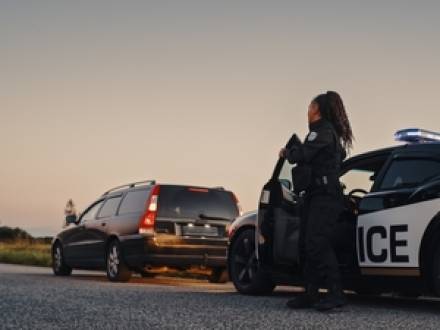Recent Blog Posts
Are There Any Defenses for CDL Violations?
 Commercial Driver’s License (CDL) holders in Illinois face unique challenges when it comes to traffic violations. The consequences of a CDL violation can be severe, potentially jeopardizing your license and your livelihood. However, there are potential defenses available that may help you retain your CDL and protect your career. An Illinois lawyer can help you explore any options you may have.
Commercial Driver’s License (CDL) holders in Illinois face unique challenges when it comes to traffic violations. The consequences of a CDL violation can be severe, potentially jeopardizing your license and your livelihood. However, there are potential defenses available that may help you retain your CDL and protect your career. An Illinois lawyer can help you explore any options you may have.
Potential Defenses to Get Your CDL Back
One of the most effective defenses is challenging the traffic stop. If the officer did not have probable cause to initiate the stop, any evidence gathered may be inadmissible in court. Similarly, if the officer failed to follow proper protocol during the stop, it could significantly weaken the case against you.
Contesting the evidence is another crucial strategy. Breathalyzers and radar guns require regular calibration, and the results may be deemed unreliable if the equipment is faulty. Law enforcement officers must also conduct field sobriety tests according to specific guidelines. Any deviation from these guidelines could invalidate the results, potentially leading to a dismissal of charges.
What Happens When Your Driving Privileges Are Suspended Across State Lines?
 Driving is a privilege that comes with significant responsibilities. This privilege, especially across state lines, can have far-reaching consequences when suspended. An Illinois lawyer can help you understand the interstate implications of your specific license suspension.
Driving is a privilege that comes with significant responsibilities. This privilege, especially across state lines, can have far-reaching consequences when suspended. An Illinois lawyer can help you understand the interstate implications of your specific license suspension.
The Impact of the Problem Driver Pointer System (PDPS) on Interstate License Revocations
The Problem Driver Pointer System (PDPS) is a critical component of the National Driver Register (NDR). This system enables states to share information about problematic drivers, ensuring that individuals cannot evade the consequences of their actions by simply crossing state borders.
When a state suspends your driving privileges, it reports this information to the PDPS. Other states can access this data when you attempt to obtain a license or are involved in a traffic incident. This interconnected system effectively creates a nationwide network of driver information, making it difficult to circumvent a suspension by relocating or obtaining a license in another state.
What to Do If You Are Falsely Accused of Burglary
 Being falsely accused of burglary can be a nightmare scenario. The consequences of a conviction are severe, including hefty fines and lengthy prison sentences. If you are in this situation, you must take immediate action to protect your rights and freedom. An Illinois lawyer can guide you through the steps you should take if you are falsely accused of burglary.
Being falsely accused of burglary can be a nightmare scenario. The consequences of a conviction are severe, including hefty fines and lengthy prison sentences. If you are in this situation, you must take immediate action to protect your rights and freedom. An Illinois lawyer can guide you through the steps you should take if you are falsely accused of burglary.
Always Use Your Right to Remain Silent
When facing a burglary accusation, your first instinct might be to defend yourself and proclaim your innocence. However, you should remember that anything you say can be used against you in court. Invoke your right to remain silent and refrain from discussing your case with anyone except your attorney. This includes avoiding social media posts or any other form of communication that could potentially incriminate you.
Hire a Criminal Defense Attorney
Your next step should be to seek the assistance of an attorney who has experience handling burglary cases. Your attorney will be your advocate, ensuring your rights are protected throughout the legal process. He will review the evidence against you, develop a strong defense strategy, and work tirelessly to achieve the best possible outcome for your case.
Defending Against Unjust Orders of Protection
 Orders of protection, also known as restraining orders, are designed to protect individuals from harassment, abuse, or stalking. However, in some cases, these orders may be issued unjustly, causing significant disruption to the lives of those accused. If you face an unjust order of protection, an Illinois lawyer can help you understand your rights and take immediate action to defend yourself.
Orders of protection, also known as restraining orders, are designed to protect individuals from harassment, abuse, or stalking. However, in some cases, these orders may be issued unjustly, causing significant disruption to the lives of those accused. If you face an unjust order of protection, an Illinois lawyer can help you understand your rights and take immediate action to defend yourself.
What You Should Know About Orders of Protection in Illinois
In Illinois, orders of protection are court-issued mandates that prohibit an individual from engaging in certain behaviors, such as contacting or coming within a specified distance of the protected person. These orders can be filed in civil or criminal court and may be granted on an emergency, interim, or plenary basis, depending on the circumstances.
What to Expect With an Aggravated Felony DUI Charge
 Facing an aggravated felony DUI charge is a serious matter that demands immediate attention. An Illinois lawyer can help you understand the aspects of an aggravated felony DUI charge, the potential consequences, and the steps you can take to protect your rights.
Facing an aggravated felony DUI charge is a serious matter that demands immediate attention. An Illinois lawyer can help you understand the aspects of an aggravated felony DUI charge, the potential consequences, and the steps you can take to protect your rights.
Understanding Your Aggravated Felony DUI Charge
In Illinois, a DUI charge can be elevated to an aggravated felony when certain aggravating factors are present. These factors may include having a BAC of 0.16 percent or higher, committing a DUI while driving on a suspended or revoked license, causing bodily harm or death to another person, having prior DUI convictions, or committing a DUI with a child under the age of 16 in the vehicle.
The consequences of an aggravated felony DUI conviction can cause havoc in your life. Depending on your circumstances, you may face one or more of the following:
Record Sealing vs. Expungement: What’s the Difference?
 If you have a criminal record, you might be wondering about your options for moving forward. Two common paths are record sealing and expungement. But what exactly do these terms mean, and how do they differ? An Illinois lawyer can help you clear up any confusion.
If you have a criminal record, you might be wondering about your options for moving forward. Two common paths are record sealing and expungement. But what exactly do these terms mean, and how do they differ? An Illinois lawyer can help you clear up any confusion.
What is Record Sealing?
When your criminal record is sealed in Illinois, it is hidden from public view. This means potential employers, landlords, and most other members of the public will not be able to access it. However, law enforcement agencies and the courts can still see your sealed record.
Sealing is available for many misdemeanors and even some felonies. Typically, you need to wait three years after completing your sentence to request sealing. Some offenses, like domestic battery, may require a longer waiting period.
What is Expungement?
Expungement, on the other hand, is a more comprehensive solution. When a record is expunged in Illinois, it is not just hidden—it is completely erased, as if the offense never happened. The arresting agency will destroy their records, and the court clerk will remove all mentions of the case from their files.
Should You Fight Against Your Traffic Ticket?
 Getting a traffic ticket can be a frustrating experience, especially if you believe you do not deserve it. You have the option to fight against your traffic ticket in court. But is it always the best decision? An Illinois lawyer can help you determine some factors to consider when deciding whether to contest your traffic ticket.
Getting a traffic ticket can be a frustrating experience, especially if you believe you do not deserve it. You have the option to fight against your traffic ticket in court. But is it always the best decision? An Illinois lawyer can help you determine some factors to consider when deciding whether to contest your traffic ticket.
Make Sure You Understand the Consequences
Before deciding to fight your ticket, you must understand the potential consequences of a conviction. In Illinois, traffic violations can result in:
-
Fines
-
Court costs
-
Traffic school
-
Points on your driving record
-
Increased insurance premiums
Depending on the severity of the violation and your driving history, these consequences can add up quickly. However, if you believe you have a strong case, fighting the ticket may be worth the effort.
What Happens After a Second Offense Traffic Violation
 If you have been cited for a second traffic violation, you may be facing harsher penalties than for a first offense. It is important to understand the potential consequences and your legal options. An Illinois lawyer may be able to help you with your second offense traffic violation.
If you have been cited for a second traffic violation, you may be facing harsher penalties than for a first offense. It is important to understand the potential consequences and your legal options. An Illinois lawyer may be able to help you with your second offense traffic violation.
Penalties Depend on the Type of Violation
The consequences for a second traffic offense depend on several factors, most notably the specific violation. Common moving violations that may result in enhanced penalties for a second offense include:
-
Speeding
-
Running a red light or stop sign
-
Improper lane usage
-
Following too closely
-
Failure to yield
-
Driving without insurance
For many of these offenses, a second violation will result in higher fines and court costs compared to a first offense. You may also have your license suspended for a longer period of time, especially if the second violation occurs within a certain timeframe of the first offense (often 12 to 24 months).
Potential Defenses for Shoplifting Charge
 If you have been charged with shoplifting, you should understand your legal options and potential defenses. Shoplifting, legally known as retail theft, is a serious offense that can lead to criminal penalties. However, an Illinois lawyer can help you build a vigorous defense and protect your rights.
If you have been charged with shoplifting, you should understand your legal options and potential defenses. Shoplifting, legally known as retail theft, is a serious offense that can lead to criminal penalties. However, an Illinois lawyer can help you build a vigorous defense and protect your rights.
What to Know About Shoplifting Laws in Illinois
Under Illinois law (720 ILCS 5/16-25), retail theft is defined as knowingly obtaining or exerting unauthorized control over merchandise from a retail establishment with the intention of depriving the merchant of the full retail value of the item.
It is important to note that shoplifting charges can have long-lasting consequences, including fines, jail time, and a permanent criminal record, which can affect future employment and housing opportunities.
What to Do After a Commercial Driver License Violation
 Receiving a violation while operating a commercial vehicle in Illinois can have serious consequences for your career as a professional driver. Commercial driver’s licenses (CDLs) are governed by stricter rules and regulations than regular driver’s licenses, and violations can result in fines, license suspensions, or even revocation. You must take the proper steps to protect your livelihood and driving privileges. An Illinois lawyer can guide you through the recommended actions after a CDL violation.
Receiving a violation while operating a commercial vehicle in Illinois can have serious consequences for your career as a professional driver. Commercial driver’s licenses (CDLs) are governed by stricter rules and regulations than regular driver’s licenses, and violations can result in fines, license suspensions, or even revocation. You must take the proper steps to protect your livelihood and driving privileges. An Illinois lawyer can guide you through the recommended actions after a CDL violation.
Request a Hearing
The first step is to understand the nature of the violation you have committed and its potential repercussions. CDL violations can range from minor infractions like speeding or failure to signal to more severe offenses like driving under the influence (DUI) or reckless driving. The consequences may vary depending on the severity of the violation, your driving record, and whether it occurred while operating a commercial or personal vehicle.

















